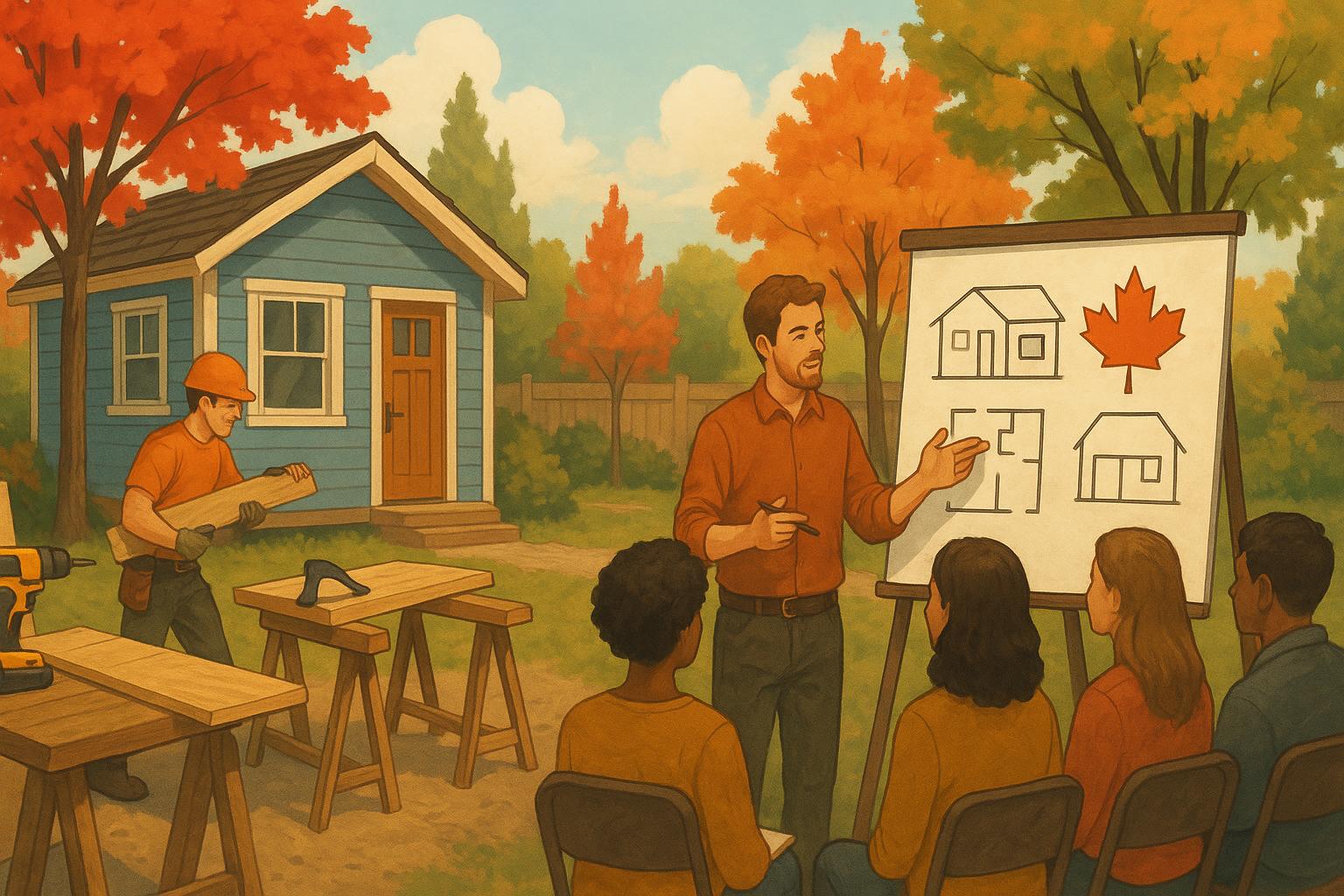
The Ultimate Tiny Home Workshop: A 2025 Guide for Canadian ADU Success
Estimated reading time: 8 minutes
Key Takeaways
- Tiny Home Workshops unite community-based learning with hands-on building expertise.
- Canadian ADU Tips offer crucial advice for cold-climate adaptation, legal navigation, and sustainable design.
- Building Events not only educate but also empower local advocates and foster long-term community resilience.
- A 2025 Guide provides actionable steps from event planning to post-workshop follow-up for success.
Table of contents
- Understanding Tiny Home Workshops: Community Education in Action
- Canadian ADU Tips for Workshop Success
- Building Community Through Education and Events
- How to Plan and Launch Your Tiny Home Workshop in 2025
- Advocacy and Beyond – Creating Lasting Impact with Community Education
- Conclusion: Why a Tiny Home Workshop Will Shape Canadian Communities by 2025
- Frequently Asked Questions
Understanding Tiny Home Workshops: Community Education in Action
A tiny home workshop is a dedicated event where participants dive into both the practical and theoretical aspects of designing, building, and living in tiny homes and ADUs. More than just lectures, these workshops offer hands-on learning, real-time problem solving, and a space for collaboration.
What Happens at a Tiny Home Workshop?
-
Hands-On Learning
Participants get to physically interact with building materials and tools. Live demonstrations allow practice in techniques such as framing, insulation, and plumbing. For example, workshops at the Tiny Home Show Ontario 2025 let attendees experiment with insulation samples and construction kits. For additional insights, visit Tiny Homes: Space Optimization, Cost-Effective Living, and Sustainable Design Explained.
-
Expert-Led Sessions
Industry professionals such as certified builders and architects lead sessions on topics like structural framing, local building codes, integrating off-grid utilities, and sustainable material selection. Learn more with resources like Ecohome: Tumbleweed Tiny House Workshop Toronto and Toronto Workshop. Additional guidance can be found at Tiny Home Living: Your Complete Guide to Micro Homes, Sustainability, and Lifestyle Freedom.
-
Community Knowledge Hubs
Workshops foster an environment of sharing where both new and experienced builders can network, troubleshoot, and celebrate their successes together. For tips on building reliable partnerships, see How to Choose a Reliable Tiny Home Builder Canada.
-
Comprehensive Coverage
Every subject from choosing the right appliances to understanding local bylaws is explored in depth, ensuring that no stone is left unturned.
As one participant remarked, The workshop turned theoretical ideas into tangible skills and connected us with a community of like-minded builders.
Canadian ADU Tips for Workshop Success
Specializing in the Canadian context means taking into account unique challenges—from bitter winters to evolving bylaws. These Canadian ADU tips ensure your tiny home or ADU not only survives but thrives.
Addressing Canadian-Specific Challenges
-
Cold-Climate Adaptation
Use materials such as high-performance spray foam insulation, triple-pane windows, and robust siding to combat the harsh climate. For further insights, refer to Tiny Home Show Ontario 2025 Practical Tips and How to Build a Winter-Proof Tiny Home Designed for the Harsh Canadian Climate.
-
Legal and Zoning Guidance
Stay updated with local municipal codes and provincial regulations. Workshops often include sessions with legal experts to guide participants through permits, fire separation requirements, and insurance considerations. Read more at Canadian ADU Regulations: A Comprehensive Provincial Guide.
-
Solving Common Issues
Address problems like finding flat building sites or securing utility hookups by sharing case studies and real-life examples. Group discussions at workshops provide actionable insights tailored to local challenges.
-
Essential Tools for Success
Utilize downloadable checklists, municipal application templates, and a curated supplier list to streamline your project setup.
Building Community Through Education and Events: The Power of Building Events
Tiny home workshops are catalysts not only for learning but also for community building. They create a network of engaged citizens who share resources and support each other.
Fostering Connection & Advocacy
-
Networking and Group Learning
Workshops encourage group activities and live Q&A sessions, making it easier for new builders to ask questions and learn from experts.
-
Organizing Impactful Building Events
Partner with local organizations to expand your reach. Familiar events such as the Tiny Home Show Ontario 2025 serve as blueprints for launching your own event. Further tips can be found at ADU Co-Housing Canada: A Comprehensive Guide.
-
Supporting Ongoing Education
Post-event forums, regular meet-ups, and digital newsletters help keep the network active and informed.
-
Sharing Success Stories
Highlighting completed projects motivates potential builders and reinforces the workshop’s value.
How to Plan and Launch Your Tiny Home Workshop in 2025: A Practical 2025 Guide
Step 1: Assess Local Interest and Needs
Begin by conducting a simple survey among local residents to gauge interest in tiny homes and ADUs. Ask about priorities such as affordability, sustainability, or downsizing.
Step 2: Secure Resources
-
Find Your Venue
Consider community centres, maker spaces, or ready build sites.
-
Invite Professionals
Enlist local builders, architects, energy advisors, and legal experts.
-
Gather Materials
Prepare samples and tool kits. Explore options for prefab modules at Prefab House Revolution: How Modular Design is Redefining Modern Housing.
Step 3: Develop Tailored Content
Address major Canadian ADU tips, including insulation strategies, permit applications, and sustainable materials. Enhance your agenda with printable tip sheets and checklists.
Step 4: Promotion Strategy
Leverage local social media, community newsletters, and early bird promotions to drum up interest. Cross-promote with established events such as the Tumbleweed Toronto Workshop and Toronto Workshop.
Step 5: Deliver the Workshop
Structure the day with keynote sessions, interactive breakout groups, and hands-on labs. For design inspiration, check out Tiny Home Design in Canada: Expert Tips for Maximizing Small Living Spaces.
Step 6: Post-Event Follow-Up
Keep the momentum going with online forums, regular meet-ups, and newsletters featuring regulatory updates and success stories.
Advocacy and Beyond – Creating Lasting Impact with Community Education
Workshops lay the foundation for enduring change. As alumni become local advocates, they form support groups, drive policy changes, and continue fostering community education.
-
Form Local Support Groups
Establish committees and regular meetings to keep the dialogue active.
-
Expand Community Education
Create online forums, host digital learning sessions, and invite guest speakers on topics such as Canadian ADU trends.
-
Drive Policy Change
Use the collective experience from workshops to engage with local policymakers and advocate for informed zoning changes. See the impact at the Ontario Building Events Guide.
-
Host Follow-Up Events
Organize annual build days or open houses to showcase successes and foster continued community dialogue.
As one experienced organizer noted, Our workshop was just the beginning – the community spirit it ignited continues to drive local change.
Conclusion: Why a Tiny Home Workshop Will Shape Canadian Communities by 2025
A tiny home workshop is more than a building class; it is a transformative tool that empowers communities to tackle affordability, sustainability, and local policy challenges. Through hands-on learning, expert insights, and dynamic community engagement, these workshops lay the groundwork for smarter, resilient, and more connected neighborhoods.
Whether you are a homeowner, builder, or advocate, engaging in or organizing a workshop catalyzes positive change—preparing Canadian communities for a future where sustainable living and supportive networks drive lasting impact. Explore resources like Tiny Home Show Ontario 2025, Tumbleweed Toronto Workshop, and Toronto Workshop to start your journey.
Frequently Asked Questions
What exactly is a tiny home workshop?
It is an event where participants learn both the technical and practical aspects of designing and building tiny homes and ADUs through interactive sessions, hands-on activities, and expert-led discussions.
Who should attend these workshops?
Homeowners, future builders, and community advocates all benefit from the workshop, whether you’re looking to build your own tiny home or support local housing initiatives.
How can these workshops help with Canadian-specific challenges?
The workshops provide targeted advice on cold-climate adaptation, legal and zoning guidance, and sustainable design—ensuring your project meets the unique requirements of Canadian homes.
Are there follow-up opportunities after a workshop?
Yes, many organizers offer online forums, regular meet-ups, and newsletters so participants can continue sharing insights and updates after the event.

Leave a Reply